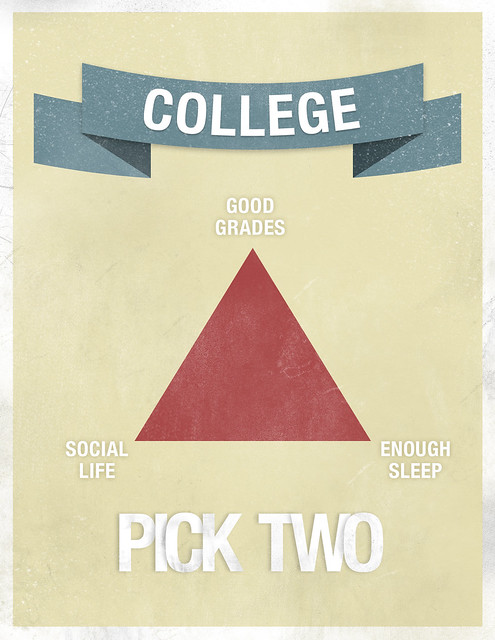Hello there,
I will be beginning my first year at UofT in September. I’m in the Life Sciences program in the Faculty of Arts & Science. I’ve been worrying about the course load that accompanies university. I’m concerned about the stress of doing my best in my courses all the while managing to find the time to relax with friends and family. I will be commuting to and from UofT every day, which will take up quite a bit of my time. I just want to be able to have time to maintain the relationships with my friends and boyfriend, and not have to constantly be studying. I was just hoping for advice on how to manage my time to make the most of my university experience. Also, I was wondering what an average Life Sciences student’s schedule would be like. How many hours would a Science student spend in class on average? How much reading will I be expected to do on my own? Is it difficult to have a social life while in university?
Thanks in advance.
– Madeline
———————————————
I applaud you for considering time management before actually starting at UofT. I’d say the average student only considers time management following a view of their abysmal midterm grades, so yay you for considering that university is tough and will require some prioritizing.
I’m sure you’re used to seeing things like this:

What I’m going to tell you is that you can actually have all three — provided you don’t go straight into the habiting of dicking around and ignoring all obligations. It’s actually super easy to have all three plus a little extra money!
My advice to managing your time?
I know, I know. You’re probably wondering “how the heck will that help me?” but if there’s anything that’s managed my time throughout these years at UofT, it’s the blessed work-study program. While having a job certainly adds hours to your weekly schedule, it also forces you to get your act together. If you know you’ll only have three hours to work on x, you won’t procrastinate because it actually occurs to you that you really only have three hours to work on it!
My next piece of advice to prioritize.
There are things that matter in life, fine. For some, there are friends, family, and a boyfriend. For others, it’s about tumblr, burritos, and Jon Snow. But in the end, weeeeeell you’re only in university for four years (ideally).
Like they can all wait.
Likewise, you have four months off between things! And then weeks off between semesters! I’m not saying you need to alienate everyone around you, but hot damn if you want to succeed, maybe taking your friends up on that offer to visit that new bar on College isn’t totally necessary. And with family, depending on how your schedule works… well they’ll understand. Who, if not you family, wants your to succeed? As for your boyfriend, I dunno, get him a video game or something to pass the time with for when you’re busy studying.
But just plan your week accordingly and you should have time for everything. 🙂 You don’t actually need to see your bff or your bf every day.
You have to commute. Fine. I did. Lots of people did/do! So try to use your commute to the fullest. If you don’t get severe motion sickness, do your readings on the subway. Or if you want to spend time with the boyfriend and he’s going the same way, commute together.
On that note, a great way to still spend time with people but get stuff done is to study together! There are tons of places on campus that are quiet enough that you can get some learning done while also, if a random thought that needs to make itself known pops into your head, you can just talk.
(Also, TOP PRIORITY, said places typically allow for food.)
As for how many hours a life sci student might spend in class, take a look at the course calender. Beside every course title is something that actually tells you how many hours you’ll spend in lectures/tutorials/practicals/etc for that class and divide by 12 or 24 depending on length of class.
So for BIO120H, which I assume you’ll be taking, for the semester, you’ll be spending 24 hours in lecture and 15 in practicals.
If you’re going with the 5.0 FCE a year route, you’ll have five classes and probably spend about 12-15 hours a week in lectures et al. Then add maybe 1 to 2 hours of studying for every hour of lecture. It’s really hard to gauge though how much time you’ll have to spend on readings and how many readings there will be since there are just so many variables involved.
I know this might seem a bit overwhelming but think of it like this: you’re about to become a full-time student. Rather than contributing 9 to 5 hours to a job, you’re contributing it to learning. So while the prospect of spending 35-40 hours a week devoted to university might seem unreasonable, in the long run… well, it really isn’t.
And again, so you don’t freak out, always keep in mind that it’s temporary! 🙂
But it’s not hard to have a social life. It’s not hard at all! You can meet people in your classes, in clubs, yada yada yada. You’ll still hold on to your high school friends too, so fear not. Just don’t try to over exert yourself. Going out two times a week or so is enough to not let your brain rot in academia.
Good luck with your next year and welcome to UofT!
xoxo,
aska

9 Comments
Random
I hope you brought some lube.
– UofT Life Science graduate and current UofT MSc student
Madeline
Thank you for your advice, it has really made me feel better.
If I stay on top of school work and use my time wisely I’m sure I’ll be able to keep the relationships I enjoy being a part of.
Thanks again, it’s great to know that it is possible to have time for everything.
– Madeline
Perry
It’s stressful to try to carry every course you need and fit in jobs and friends. A great way to handle this is by managing priorities. Having balance in your life will help you keep your energy up to get everything done.
Tom
Here’s one thing to note (at least in computer engineering) – most of the high-achieving students (i.e. those who make the dean’s list which requires a minimum session average of 80%) are VERY active in extracurriculars and/or the student body.
In fact, a lot of the average and below-average students are quite introverted and have no social life.
The more sociable people are more likely to give help to and receive help from one another for individual work and when studying for exams, which helps their academic performance.
Additionally, a lot of important work in engineering courses has to be done in groups, so being more sociable significantly raises your chances of getting into a good-performing group and thus a good grade. Especially in design project courses where one group project = the entire grade.
Plus, smart engineers are able to judge when certain classes are just not worth attending (i.e. useless lecture, tutorial where nothing is marked, lab that can be done from home) – so they skip those classes and hang out with others and self-study later on. In the semester where I scored my best marks, I attended less than 10 hours of class per week despite ROSI saying it was 22 hours. I haven’t met a high-scoring engineer who hasn’t intentionally skipped something every semester.
This doesn’t mean that being sociable automatically equals better grades, but it certainly helps if you learn to balance things.
The notion that U of T destroys your social life if you want to have good grades is an absolute myth.
Masked Advisor
Bla bla bla.
What you need to do is mark your calendar for assignments, avoid notoriously difficult courses, and push yourself to study at least 2 weeks in advance of every midterm. Then you’ll be okay.
I actually strongly suggest avoiding extracurriculars at least until your first midterm. Almost everyone I knew scored in the low 60s (the class average) because they underestimated the real nature of the beast of life science at UofT.
I got a high GPA (3.95) in life science and I was a president of a couple of councils, but trust me when I say, it will take 5x more work than you think it would (and I know u think itll be more than high school).
Life science is different than Engineering. Engineering may have difficult material, but life science has difficult competition. Engineering students GENERALLY are happy with 60s, Life science students cry over 79%’s. It’s a totally different ball game, so don’t listen to some of the engineering advice. It’s incompatible. In life science, getting a high GPA is about outcompeting other students in ranking. In engineering, where most are happy with <75% grades, the rate limiting factor is actually how much you understand the material (so it's easier to do well if you know your material well).
Masked Advisor
That is because of the bell curve, which fixes the average in a range. Engineering students usually get bell curved up, Life sci kids get bell curved down.
Masked Advisor
There is ranking in Engineering, but getting higher up the ranking isn’t as hard because a higher proportion of engineering students don’t care much about ranking than life science students do. Here’s why: life science students generally need to get into grad school (minimum 77% undergrad average) or medical school (minimum 85% average, easier said than done) to get a decent job. Most engineering students will be done by the time they graduate and don’t depend on grades as much as life science students do. Thus, the competition in Engineering is less intense. Eng Sci is another situation though.
Tom
True, life science is more intense and competitive than engineering.
To clarify, I did mention that most HIGH achieving engineering students (those on the Dean’s List) are active in extracurriculars. Including the top 10 rankers. It’s not just those content with 75% – it’s those scoring 80’s and 90’s.
We do usually get curved up rather than down – but by 3rd and 4th year, many classes actually have no bell curve due to most of the “dumb guys” having dropped out. It’s common to see exam averages in the 70s and above without any sort of adjustment in Years 3 and 4. Even EngSci. I know this because Engineering now allows you to view your final exams for free and the math adds up.
You do have a very valid point though – to get into med school and good grad programs you probably have to torture yourself in order to exceed the minimum requirements as much as possible. I’ve known people with 3.8 GPAs who couldn’t get into med school. Really sucks.
As for engineering students being generally happy with 60’s, I dispute that, lol. Grades do make a difference even for those seeking employment right after undergrad, and especially for internships (which are required to graduate). They won’t be clear-cut, i.e. having 4.0 does not in any way give any advantage over 3.5, but when the differences are extreme, i.e. 4.0 vs 2.0 then prospective employers are naturally going to be biased, especially if hundreds or even thousands of applicants are going for that one position.
aska
omg i just need to let the two of you know that we in the aska lair ship tom/m.a. sooooo hard.